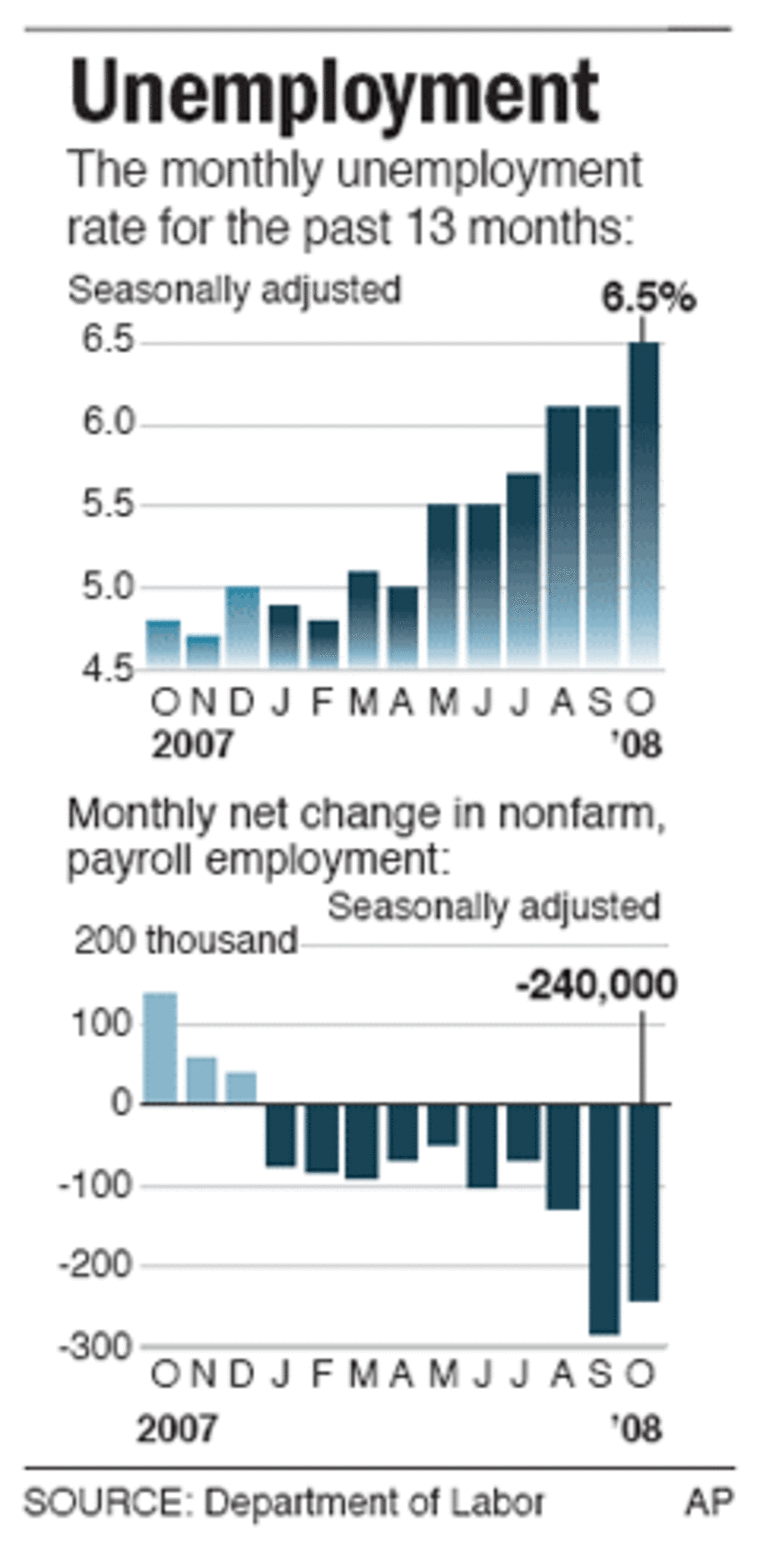Friday's dismal employment report underscores the urgent need for President-elect Barack Obama to act quickly to get the economy back on track. But as the devastating economic downturn gains momentum and spreads around the globe, there is a growing concern that any actions under the new administration will have little impact in the short term.
Voters made clear they want the new Congress and the Obama administration to make the economy a top priority. More than six in 10 voters surveyed in exit polls cited the economy as the most pressing issue facing the nation, and nine of 10 said the economy is in bad shape. The other four major issues cited as most pressing — Iraq, energy, terrorism and health care — were picked by one in 10 or fewer.
The latest evidence of the downturn's severity came Friday, when the government reported the nation's employers slashed another 240,000 jobs in October, pushing the unemployment rate to a 14-year high of 6.5 percent. The economy has shed about 1 million jobs so far this year in a downturn that appears likely to be the worst recession in decades.
Obama met with economic advisers Friday amid widespread calls for fresh steps to halt the economy’s rapid deterioration and begin to turn things around. There’s no shortage of ideas: tax breaks for businesses, massive spending on roads and other infrastructure projects, government support for the ailing auto industry, tax credits for new home buyers and aggressive government intervention to backstop failing mortgages, among others.
But it will take time for any of these measures to begin to have an effect. And in the meantime, the latest economic data suggest that things are getting worse.
Consumers — who account for two-thirds of U.S. economic activity — have pulled back sharply in just the past few weeks, as job losses and the turmoil in financial markets have left them spooked. On Thursday, retailers reported steep drops in October sales. Carmakers also saw sales plunge last month, with General Motors posting a 45 percent drop, and Ford and Chrysler reporting comparable pullbacks.
Government support may help the Big Three survive the storm, but there is little government can do to stop it in the coming months.
Dealers face several major problems selling cars. The worsening job market has potential car buyers putting off a purchase until things get better. The panic in the markets that began in September has only made matters worse. Those few customers who are stepping up to buy are having a much harder time getting financing from lenders who have sharply tightened their underwriting standards.
The result, according to AutoNation CEO Michael Jackson, is a downturn beyond the auto dealership chain’s “worst-case scenario.”
“At least we had planned for worst case and were operating for worst case,” he said. “But clearly, we're past that now. The financial panic that has occurred deep into the down cycle for housing and automotive is past worst case.”

The slump has spread well beyond the battered auto and housing industries to the wider economy, sending the gross domestic product into reverse in the third quarter and signaling that a recession is likely under way.
Initially concentrated among the battered housing and construction industries, job cuts have now spread to most sectors, from retailing to professional services. About the only sectors showing growth are health care and government. With dozens of states aggressively slashing budgets to fill gaping deficits, government job losses are expected to increase.
Obama’s economic policies likely will have even less impact on the widening global slowdown. Over the long term, efforts to expand trade and coordinate oversight of global financial markets may have a positive impact. But the short-term global outlook is “dismal,” according to Howard Archer, chief European economist for IHS Global Insight.
“It is apparent that the heightened financial crisis is having a serious dampening impact on already struggling Eurozone economies and is significantly intensifying the danger of deep, extended recession,” he wrote in a recent note to clients.
Even the perennially vibrant Chinese economy is feeling the effects of the global downturn. Economists at Credit Suisse are forecasting that China’s GDP growth could be as low as 5.8 percent in the fourth quarter of this year, down from 11.4 percent in 2007.
That global slowdown could feed on itself as lower consumer demand crimps trade flows between countries. The Credit Suisse economists note that when one country is in recession, imports typically fall as consumers cut back, but exports hold steady as demand remains strong in overseas markets.
But with most economies slowing around the world and the dollar rising, demand for U.S. exports is expected to fall. That could bring yet more U.S. layoffs.